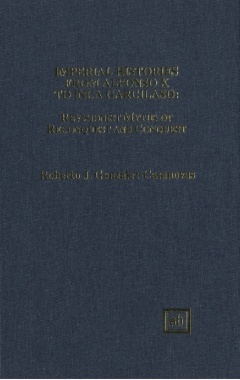This study situates medieval, renaissance, and colonial Spanish chronicles about the Reconquest of Iberia and Conquest of America in comparative cultural contexts of Iberian expansion. The book's purpose is not to survey or compare the chronicles themselves in terms of discrete traditions, contents, or forms, but rather to construct a critical model of national-imperial historiography as a discourse of cultural authority and reception. These issues are examined in relation to the authorial-editorial frames in works from Alfonso X of Castile and James I of Aragon to Columbus, Cortés, Cabeza de Vaca, Las Casas, Díaz del Castillo, and Inca Garcilaso; they are accompanied by parallel readings of Portuguese, French, and Italian works by Barcelos, Joinville, Compagni, and Camões.
- Cover
- Contents
- Preface
- Chapter 1: Critical models of cultural historicism for Iberian history and historiography
- 1.1 Cultural textuality and cultural interpretation: History as context, intertext, and metatext
- 1.2 Cultural-historicist approaches to historiography: History as discourse, example, and critique
- 1.3 Cultural revisionism in historiography: From mythopoetics to ethical rhetoric
- Chapter 2: National-imperial propaganda of the Castilian/Hispanic Reconquest
- 2.1 The Alfonsine historical discourse on Hispania
- 2.2 Fecho d'Espanna, fecho d'Imperio: cultural politics and poetics
- 2.3 Señorío as royal authority: History-making and history-writing
- Chapter 3: Popular myths of the Reconquest in Alfonso X's prosified epic songs
- 3.1 Epic discourse in vernacular chronicles: Heroic historiography
- 3.2 National stories as historical-poetic canon: Gestas to estorias
- 3.3 Cantares de gestas as narrative example and historical authority
- 3.4 National heroes as historical exemplars: Count Fernan González
- 3.5 Epic texts and types as models for the Alfonsine chroniclers
- Chapter 4: Chivalric and crusading revisionism in Iberian royal-aristocratic chronicles
- 4.1 Chivalric codes in Ibero-Christian frontier chronicles
- 4.1.1 Iberian transformation: history of reconquest as refoundation
- 4.1.2 Prologues: national historiography as courtly mythography
- 4.1.3 Christian restoration: story of reconquest as reconversion
- 4.2 Mirror of Christian chivalry: St. Fernando III as crusader-king
- 4.2.1 Reconquest deeds: past and present
- 4.2.2 Critical models: Alfonsine history of Iberian crusade
- 4.2.3 Historicist model: Alfonsine history on Fernando III
- 4.2.4 Reconquest heroes: champions and exemplars
- Chapter 5: Heroic typology and historical authority in late-medieval Romance chronicles
- 5.1 National history and vernacular propaganda
- 5.2 Royal reformation in Alfonso X
- 5.3 Aristocratic adventure in Jaume I
- 5.4 Political hagiography in Joinville
- 5.5 Social prophecy in Compagni
- 5.6 Courtly chronicles and popular reception
- Chapter 6: Discourse of changing eras in histories and stories from the Reconquest to the Conquest
- 6.1 Ages of expansion and discovery: Old and new frontiers
- 6.2 Historical interpretation of conquest as mission
- 6.3 New Iberian narratives about New Worlds
- Chapter 7: Cultural-historical transition in Colón's rhetoric of quest and Utopia
- 7.1 The cultural rhetoric of discovery
- 7.2 Colón's medieval typology of the quest
- 7.3 Colón's Renaissance myth of Utopia
- 7.4 Cultural discourse as typology and mythology
- Chapter 8: Authorial-editorial frames in reports of the Discovery and histories of the Conquest
- 8.1 Critical interpretations of historiographic authority: New and old orders for Iberia and America
- 8.1.1 Cultural models for colonial historical authority
- 8.1.2 Towards a critical model of colonial historicist semiotics
- 8.2 Humanist critique of (pre)history in Inca Garcilaso: Old and new empires in Peru and Spain
- 8.2.1 Humanist-historicist hermeneutics of Old and New Worlds
- 8.2.2 Historical authority, oral tradition, and textual revision
- 8.2.3 Iberian and indigenist reception in the Inca Garcilaso
- Chapter 9: Conquest Utopias and dystopias as historical paradigm and parable: New World myth, Old World reception
- 9.1 Plato's vs. More's model: Historical rise/fall of empires
- 9.1.1 Utopian textuality in Iberian histories of Conquest
- 9.1.2 Utopian historiography as cultural mythography
- 9.2 New Spain and New World: Historic transformations
- 9.3 Golden Age, Promised Land: Propaganda and critique
- Chapter 10: Revisionist histories and myths of the Iberian Reconquest and Conquest
- 10.1 Medieval-Renaissance Iberian historicism: Issues of authority, reception, revision
- 10.2 Ideology of Reconquest and Conquest: Discourses on civilization, mission, empire
- 10.3 Comparative models of historiography: Functions of narratives, myths, examples
- 10.4 Cultural-historicist models of Iberian expansion
- Notes
- Select Bibliography: Works Cited or Consulted
- Abbreviations
- Section 1: Editions of Texts
- Section 2: Critical Studies
- Appendix: Models, Texts, Chronology
- Table 1: Romance chroniclers' authority [chapter 5]
- Tables 2A+B: Heroic typology of Fernando III [chapter 4.2]
- Tables 3A+B: Colón's rhetoric of quest and Utopia [chapter 7]
- Tables 4A+B: Authorial frames in Conquest chronicles [chapter 8.1]
- Table 5: Chronology of Reconquest and Conquest
- Index

